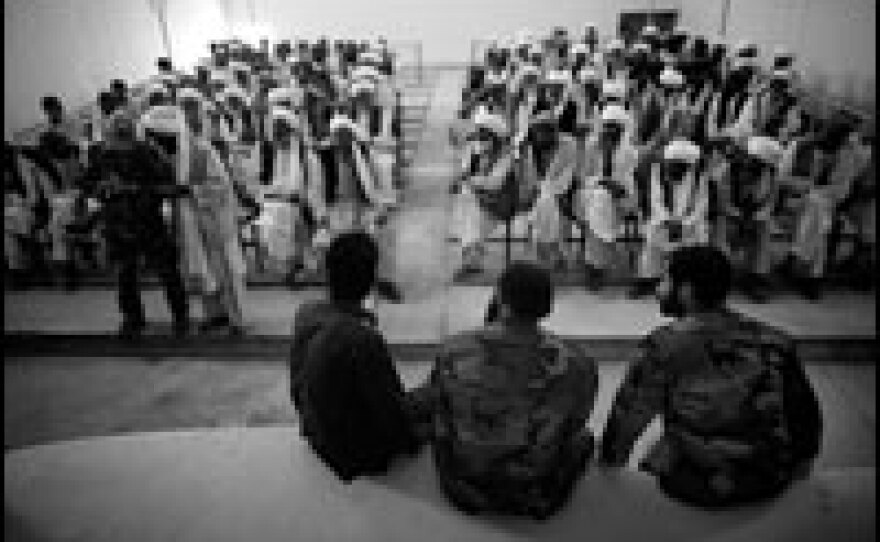


In Afghanistan, corruption is a daily plague. It comes in many forms: a piece of land for a warlord with connections to the national government, a bribe to a customs agent to look the other way as a shipment of heroin passes through.
Corruption takes other forms, too, such as kidnappings, ransom demands and bodies left out in the hills — all with the help of Afghan officials.
On a recent day, and on short notice, a Green Beret team has been called to a meeting, known as a shura, at a village school in Shindand district in Afghanistan's western Herat province.
A long, snaking line of cars and minivans rolls in, kicking up plumes of dust. Tribal elders, 150 of them, pour out of the vehicles. They are dressed in turbans and robes. Most have long white beards.
They surround an American soldier who has a thick beard, too. The Afghans know him well. They call him Mullah Jamal. Like other Green Berets on sensitive missions, he asked that his real name not be used.
Kidnappings A Fact Of Life
Inside the school auditorium, an elder addresses the Americans. Through a translator, he complains about kidnappings and ransom demands. Soon, it becomes clear the meeting has been called to discuss the recent kidnapping of a gas station owner — a wealthy man in this poor society.
But there is a twist: One person allegedly involved in the kidnapping is the subgovernor of Herat province — the No. 2 official in the area.
The elder says that kidnappings are a fact of life. What makes this one all the more painful is that the government official who should be helping them is part of the problem.
None of this is new to the U.S. soldier known as Mullah Jamal. The burly, 24-year-old Arab-American, who studied economics at the University of Arizona, is this Green Beret unit's intelligence officer.
The elders and the Americans say the deputy governor is a former Taliban commander, who is still in touch with his old comrades. They say his brother is directly involved in the kidnapping ring.
Death Threats Real
In the middle of the meeting, one of the elders pulls out a cell phone, puts it on speaker and calls the kidnapper — a notorious criminal named Noor Wdin. For more than a month, he has held the gas station owner, demanding $20,000 in ransom.
The kidnapper says the deadline is that day.
Suddenly, a stocky, younger man rises from his chair. He calls out and begins to cry, wiping away tears and stumbling toward the Americans.
The elders coax him back to his seat, where he slumps over and weeps.
The translator says the kidnapper has said that if the ransom is not paid that day, they will kill the gas station owner, the weeping man's brother.
It's no idle threat. The elders say this ring has carried out more than two dozen kidnappings. Some families who don't pay receive another cell phone call — telling them where to pick up the bodies of their loved ones.
Problems Extend Beyond Kidnappings
The Americans promise they will help, that they will contact the deputy governor. That's the easy part. The harder part involves building a better government — that's what the Green Beret team leader tells the elders.
"I understand that your family gets kidnapped. I understand that you want results quickly," he tells the crowd. "It may fix your one problem, but the way you fix this is by fixing the government. If the subgovernor is broken, then we can fix it. And again, it's hard, it's a lengthy process, but it's the right way to do things for your country."
It is, in essence, a civics lesson from the Americans, who are trying to help Afghans understand how government is supposed to work. The Green Beret captain says this is done by voting, by putting their names on petitions, by demanding action.
The tribal leaders are living what Washington calls "lack of governance," a key obstacle to success in Afghanistan.
The elders say they have appealed to the governor, the police chief and others. If the Americans can't help, they say, they may take matters into their own hands: pick up a gun and seek revenge.
But the Americans explain how doing something like that would be a step backward. Mullah Jamal, the Green Beret, appeals to them.
He asks for two days to sort out the kidnapping. The elders say they are willing to give the Americans a chance and file out of the auditorium.
Tip Of The Iceberg
Two days pass and the Special Forces team has contacted the subgovernor, who tells them the gas station owner is still alive.
Now, the Green Berets — including Mullah Jamal — drive to pay a visit to the kidnapper, who lives nearby.
A half-hour later, the U.S. soldiers return, empty-handed but optimistic.
"Just by virtue of us being interested, it does go a long way," Mullah Jamal says. He feels as if he is making progress, but just on this one case.
"You guys haven't even seen the tip of the iceberg. There are probably five or six other kidnappings in Shindand district. Do we know about them? No. The only reason why we know about this is because it's directly linked to the subgovernor. That's the only reason why that it's been brought to our attention," he says.
NPR contacted the subgovernor, Mullah Lal Muhammad. In a hasty phone call, he would only say he was trying to get the gas station owner released. Then he turned off his phone.
Later the same night, the gas station owner was released, unharmed and without incident, according to an e-mail NPR received from the Green Beret team. One problem was solved, but the larger issue in Afghanistan — the lack of governance — remains.
Copyright 2022 NPR. To see more, visit https://www.npr.org. 9(MDAzMjM2NDYzMDEyMzc1Njk5NjAxNzY3OQ001))






